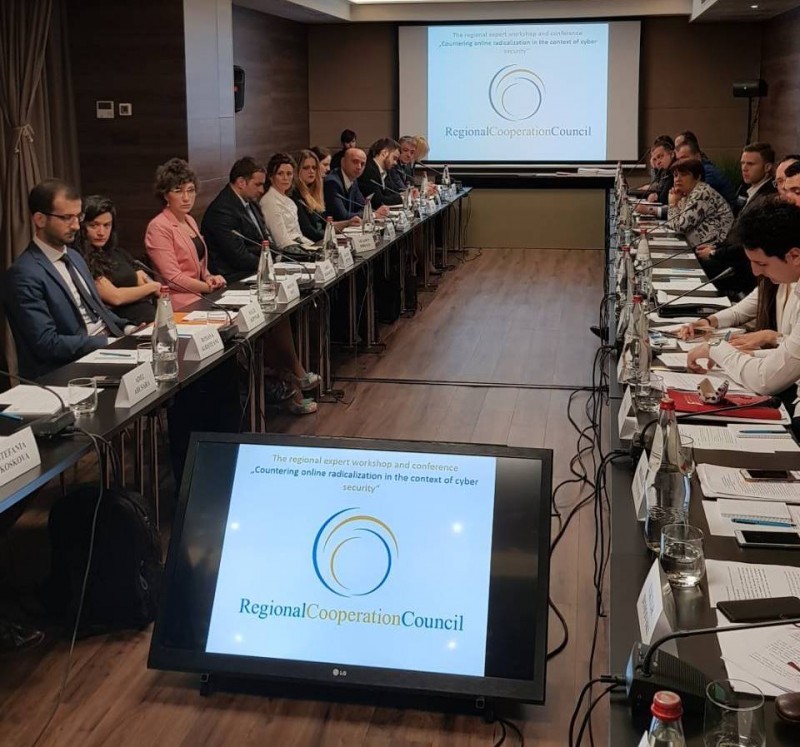- Home/
- News
Highlights from participants' interventions from the RCC regional expert workshop and conference “Countering online radicalization in the context of cyber security” (17-18 April 2018 in Belgrade)

RCC-organised Regional Expert Conference and Workshop on Countering Online Radicalisation, Belgrade, 17-18 April 2018 (Photo: RCC-Natasa Mitrovic)
The regional expert workshop and conference “Countering online radicalization in the context of cyber security” was organized back to back with the 5th Meeting of the NFP Group, on 17-18 April 2018 in Belgrade. The event was aimed to debate on inter-connection between countering online radicalization and cyber security efforts and to provide some recommendations for action for the main stakeholders – relevant national authorities first and foremost. The debate was centred on the following important aspects: fake news and hate speech; recognizing, following and countering online terrorist and violent extremist propaganda; challenges to define and protect critical infrastructure and practical experience in countering cyber-attacks and strengthening resilience of vital digital systems.
Highlights from participants' interventions:
• Recognizing the seriousness of the fake news issue, the European Commission set up specialized response mechanism. Legal sanctions have to be developed in order to fight this phenomena. The Western Balkans is also severely affected, on daily basis by fake news which are in most cases, produced by traditional media but also by individuals. As one of recommendations, it has been said that the „High risk List of Media “that will analyse and review the reports and news of questionable truth (disinformation, fake news, mistake, clickbait) should be created.
• It is estimated that by 2022, there will be a 5 billion of active internet users. Cyber security is one of the main issues requiring urgent and proper response. For example, in 2017, 65% of internet users in USA experienced cyber-security breach.
• All Western Balkan economies have established national Computer Security Incident Response Teams (CSIRTs), while establishing of networks, cooperation and joint action at regional level is still in early stages of development. CSIRTs provide three types of services: proactive; reactive and supportive.
• There is a need to further develop critical infrastructure and early warning system to prevent cyber incidents. First on regulatory-policy levels, at national level with cooperation of the public-private partnership and immediate investment in national cyber capacities. It has been pointed out that there are three main issues in the context of challenges to define and protect critical infrastructure: political; technical and legal.
• In general, WB is missing overall cyber-security culture. Capacities of existing bodies are weak with a low level of cooperation with the private sector and absence of cyber-security education and comprehensive capacity building programmes.
• The following areas were mentioned as the most vulnerable to cyber-attacks: Energy sector; security of networks and information; cloud computing services; hacking into computer systems; inserting viruses to venerable networks; Denial of Service (DOS) Attacks and on-line terrorist threats.
• A multilateral level of cooperation should be established and efforts should be focused on: capacity building of the state administration in the region; awareness raising in the region (“Two lingua franca – Microsoft Campaign); law enforcement agencies cooperation on tackling cyber-crime and CERTs exchange of information; regular information sharing at national and regional level and adoption of new legislation.
• It is extremely important to develop counter-narratives in the area of on-line radicalization propaganda and cybersecurity. Identifying attackers while costs of cyber-terrorism tools are extremely low is of critical importance.


 Development of specialized PCVE web site is funded by EU FUNDS CN 2017-386/831 - "IPA II 2016 Regional Action on P/CVE in the Western Balkans"
Development of specialized PCVE web site is funded by EU FUNDS CN 2017-386/831 - "IPA II 2016 Regional Action on P/CVE in the Western Balkans"